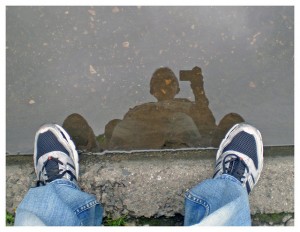
What qualities define spiritual maturity? It is a good thing to reflect on at any time: know what the target is and you have a better chance of moving toward it.
I’ve been recommending people think about the question now, in Lent, following the model of Thomas Hooker, 17th century Puritan and founder of Connecticut. Hooker wrote a little piece called “The Character of a Sound Christian in Seventeen Marks.” It is his own summary of character qualities, habits of the soul you might say, each one with biblical quotations that he thought it was rooted in.
A couple of weeks ago, when I first mentioned Hooker, I asked what my readers would put on such a list. It didn’t gather a lot of discussion, but there were three fine suggestions:
Integrity.
Humility.
A response of love when personally attacked.
Glad to see that you folks set a high bar.
Here is #1 on Thomas Hooker’s list
Mark I. If thou canst mourn daily for thy owne corruptions and failings committed, yet so as to bee thankfull for the grace received.”
And here is his biblical support:
Rom. 7.24. Oh wretched man that I am, who shall deliver me from the body of this death? Ver. 25. I thank God through Jesus Christ our Lord, &c. So then with the minde I my selfe serve the law of God, but with the flesh the law of sinne.”
Okay, this was 1656. They hadn’t really invented spelling yet.
You can still get the point: Hooker thinks a mature Christian is someone who has three things:
First, maturity has appropriate self-assessment. When we look at our reflection, all is not beautiful. We see issues that need attention. Not that we see no virtues and strengths. The point is we look honestly and really see ourselves.
Sometimes we were flat-out seeking the wrong things.
When we were seeking the right things, sometimes we tried to get them in the wrong ways.
And even when we were at our very best our motives were at least a teensy bit mixed.
Second, maturity has appropriate feelings about what we see. You’ve probably noticed that kids can be cruel. It takes a good bit of growing up to develop empathy — to actually feel sad about harming someone.
Hooker calls us to have grown-up spiritual empathy. If self-assessment shows we have not lived as God calls us to live, maturity goes on to feel sad about it.
Sad for the God whom we’ve disappointed and whose purposes we’ve hurt.
Sad for the people around us whom we’ve hurt or left hanging.
Sad for ourselves since we’ve suffered our own harm.
Third, maturity is aware of grace, and grateful. This is, after all spiritual maturity. We are able to look honestly at our lives because we know we are loved by God. We’ve received forgiveness, and been adopted into God’s family, and that makes it safe to be as honest as we can be. Sadness for bad behavior can now be the catalyst to change, as we walk toward maturity.
I agree with Thomas Hooker. Honesty with both sorrow and thankfulness makes a great starting place for Christian maturity.
————
I’d love to hear from you in the comments. What other characteristics of Christian maturity are on your list?
If you want to read more about Puritan approaches to prayer and self-examination, you’ll find a whole chapter in my book, Kneeling with Giants: Learning to Pray with History’s Best Teachers.
And if you want to read Thomas Hooker’s whole text, pick up the e-book version, where you’ll find it in the free companion volume, The Kneeling with Giants Reader: Writings on Prayer by History’s Best Teachers.

Gary, good article for Lent.
Also, I have read some of the original sources for Kneeling with Giants and while I really loved the book, I now have greater respect for the fine job you did of making those sources accessible (in some cases, neither spelling nor grammar had been invented!!) and concisely, but sufficiently, presented. I am looking forward to using it in my Sunday School class in May.
Thanks so much, Fred! Your affirmation means a lot.
Looks like my small group leaders guide should be available in time for your class, so keep your eyes peeled.
And when the class happens, I’d love to hear how the group responds.
Blessings,
Gary